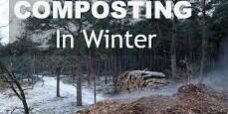Fall is a great time for composting, because everything from summer’s garden combines with the dying organic matter from trees and shrubs. But even when the organic matter of autumn is used up there’s still organic material, such as kitchen scraps, that need to be composted. And the benefits of continuing to compost that organic matter, even in winter, are numerous. Here’s a few…
One of the number one tangible benefits to compost is fertilizer. Compost is wonderful fertilizer for gardens, trees, shrubs, etc. It’s a terrific way to recycle organic matter (Remember also that most households don’t produce enough compost for a large garden/landscape space, and Rocky Mountain Compost is ready to supply the rest of your compost needs).
In wintertime, the compost pile needs to be fed enough nitrogen and carbon (both in balance). The green matter produced daily in kitchen scraps should be enough to keep the compost pile active, and any brown material like dead leaves, etc., should be added to it. In fall, when there’s brown organic material everywhere, you may want to bag some of it so that you have it when the landscape turns desolate and wintry.
You also want to keep compost warm and comfortable in winter (remember that you’re supporting living microbes). If the location of your current compost pile is away from sunlight, consider moving it—or moving the bin—somewhere the sunlight can warm it. Insulate the pile with cardboard or straw bales. Put the active part of the compost in the center of the pile and then add brown matter over the top of the pile to insulate it; the better insulated the compost the happier the microbes.
A compost tumbler makes wintertime compost needs simple. Tumblers can easily insulate those microbes, and when it spins the compost can be actively mixed without the extra work involved.
Rocky Mountain Compost is ready to help you through all your compost/soil needs, but through the winter time, when the temps drop, you may also want to ask about animal bedding material, which should be regularly changed so your outside animals can stay clean, dry, and warm throughout the winter season.







